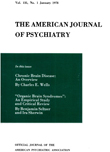Arousal and Nonarousal Enuretic Events
Abstract
Seven boys with primary enuresis were measured by 62 all-night EEGs, during which time 48 wets occurred. Imipramine was administered in a placebo, drug cross-over manner. Subjects with predominantly arousal enuresis showed increased evidence of neuroticism, a history of sporadic wetting, and no family history of enuresis. Subjects with predominantly nonarousal enuresis had minimal evidence of maladjustment, a history of regular wetting, family history of enuresis, and a better response to imipramine. The authors formulate a somatopsychic model for the etiology of enuresis, hypothesizing a pathophysiological substrate to explain the phenomenon.
Access content
To read the fulltext, please use one of the options below to sign in or purchase access.- Personal login
- Institutional Login
- Sign in via OpenAthens
- Register for access
-
Please login/register if you wish to pair your device and check access availability.
Not a subscriber?
PsychiatryOnline subscription options offer access to the DSM-5 library, books, journals, CME, and patient resources. This all-in-one virtual library provides psychiatrists and mental health professionals with key resources for diagnosis, treatment, research, and professional development.
Need more help? PsychiatryOnline Customer Service may be reached by emailing [email protected] or by calling 800-368-5777 (in the U.S.) or 703-907-7322 (outside the U.S.).



